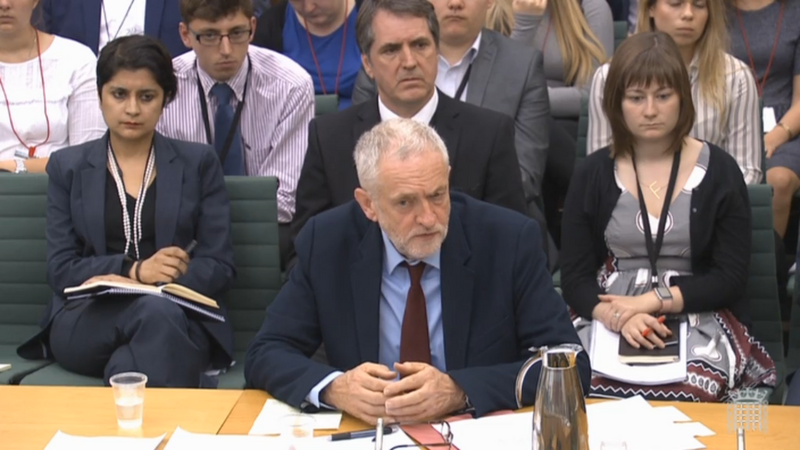Lobby Watch
16 October 2016

Published on Sunday, the Home Affairs Select Committee’s report also slams Labour leader Jeremy Corbyn for heading a party with “institutionally anti-Semitic” elements.
Despite its overwhelming focus on the opposition Labour Party, the committee admits that there is no evidence of a higher prevalence of anti-Semitic attitudes within Labour than in any other party.
At the same time, the report downplays allegations of racism and anti-Semitism in the governing Conservative Party.
Corbyn in a statement Sunday criticized the report’s focus on Labour, saying the Conservative-dominated committee had failed to look at “combating anti-Semitism in other parties.” He said that “politicizing anti-Semitism – or using it as a weapon in controversies between and within political parties – does the struggle against it a disservice.”
Palestine’s BDS National Committee said that the report “shows a flagrant disregard for Palestinian rights and history.”
European spokesperson Riya Hassan said the report would help “to suppress freedom of expression” and would encourage repression against advocates for Palestinian rights.
Defining anti-Semitism
The lawmakers’ report recommends adoption into UK law of a controversial definition of anti-Semitism which the BNC’s Hassan called “false, ahistorical and politicized.”She said the discredited definition conflates criticism of Israel with racism against Jewish people and was “designed to protect Israel’s human rights violations from censure and accountability.”
In a statement, Palestine Solidarity Campaign chair Hugh Lanning said the definition would “have a chilling effect on what can be said in opposition to Israel’s policies of discrimination and oppression towards the Palestinian people.”
In May, the International Holocaust Remembrance Alliance adopted a definition of anti-Semitism that includes “claiming the existence of the state of Israel is a racist endeavor” or “applying double standards” to Israel.
As the parliamentary report acknowledges, the IHRA definition is based on the European Union Monitoring Center’s 2005 discussion paper on anti-Semitism.
That widely discredited paper was never officially adopted by any EU body and was eventually ditched by the EUMC’s successor agency.
But Israel lobby groups have persisted in promoting it as the “EUMC definition,” seeking to have it officially adopted.
The report attempts to mollify criticism by recommending two modifications: that it is not anti-Semitic “to criticize the government of Israel” or to “hold the Israeli government to the same standards as other liberal democracies.”
But the lawmakers still list as examples of anti-Semitism a broad range of political discourse, including “denying the Jewish people their right to self-determination.”
This could potentially mean that calls for a nonsectarian democracy that gives full and equal rights to Israeli Jews and Palestinians could be defined as anti-Semitic. It could also outlaw the views of Jews who reject Zionism and the creation of a “Jewish state” on religious grounds.
“For the purposes of criminal or disciplinary investigations,” the report asserts, “use of the words ‘Zionist’ or ‘Zio’ in an accusatory or abusive context should be considered inflammatory and potentially anti-Semitic.”
Unfair criticism
The report has also been condemned by Jewish critics of Zionism, Israel’s official ideology.Jonathan Rosenhead, a London School of Economics professor and activist with the group Free Speech on Israel, told The Electronic Intifada that “Zionism has been the cause of gross injustice to the Palestinians, so in that sense, every usage of the word Zionist is accusatory.”
According to the committee, Shami Chakrabarti’s recent report into alleged anti-Semitism in the Labour Party is “compromised by its failure to deliver a comprehensive set of recommendations.” It also claims that Chakrabarti’s recent appointment to Jeremy Corbyn’s shadow cabinet “has thrown into question the independence of the Labour Party’s inquiry.”
Corbyn hit back that the committee had unfairly criticized Chakrabarti, and that her report was an “unprecedented step for a political party, demonstrating Labour’s commitment to fight against anti-Semitism.”
He said Labour would continue to implement her report’s recommendations.
In June, Chakrabarti, a widely respected lawyer who headed the civil rights group Liberty for more than a decade, launched the report into allegations of anti-Semitism, many of which were fabricated or exaggerated.
Refuting widespread media claims, her report concluded that “the Labour Party is not overrun by anti-Semitism,” but that there is a “minority” of “hateful or ignorant attitudes.”
The Chakrabarti Inquiry was widely welcomed, even by some anti-Palestinian organizations.
Conservatives off the hook
The lawmakers’ report acknowledges that “the majority of anti-Semitic abuse and crime” comes from the far right.It also states there is “no reliable, empirical evidence to support the notion that there is a higher prevalence of anti-Semitic attitudes within the Labour Party than any other political party.” Despite this, it focuses disproportionately on Labour.
While asserting that “no party can afford to be complacent,” the report dedicates only three paragraphs in its 70 pages to allegations of anti-Semitism in the ruling Conservative Party.
One of the two examples it cites allegedly took place at University College London in 2014. A member of the school’s Conservative Society allegedly said that “Jews own everything, we all know it’s true. I wish I was Jewish, but my nose isn’t long enough.”
Noting that the incident was never even investigated by the party, the report says that “questions have subsequently been raised about the veracity of the complaint.”
Such skepticism is absent, however, in the report’s detailed and highly flawed account of what transpired in Oxford University’s Labour Club after Alex Chalmers quit as chair in February.
Chalmers has never offered a shred of public evidence to corroborate his widely publicized claim that “a large proportion” of Labour students at Oxford are anti-Semitic.
As reported by The Electronic Intifada in April and May, Chalmers was implicated in a factional dispute within the Labour Party, which involved attempts to smear rivals with unsupported claims of anti-Semitism.
A dossier compiled in May by the trade union Unite shows a long list of racist statements by Conservative ministers and activists, including at least four alleged incidents of anti-Semitism.
http://redress-newsbites.tumblr.com/post/151860165134/uk-lawmakers-push-to-outlaw-criticism-of-zionism
No comments:
Post a Comment